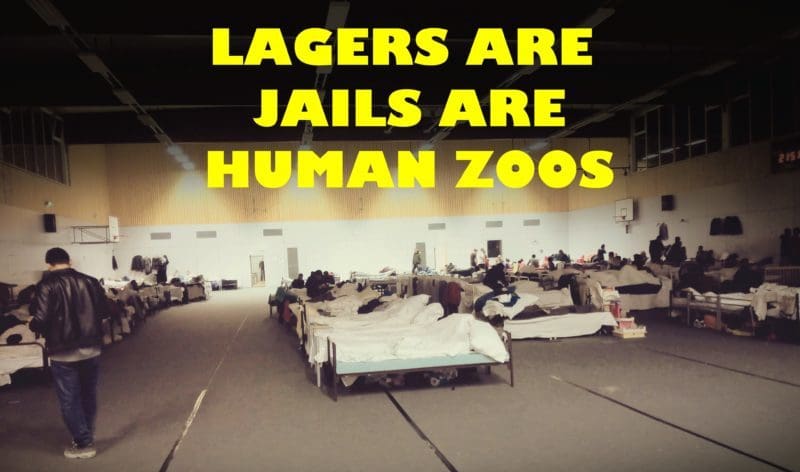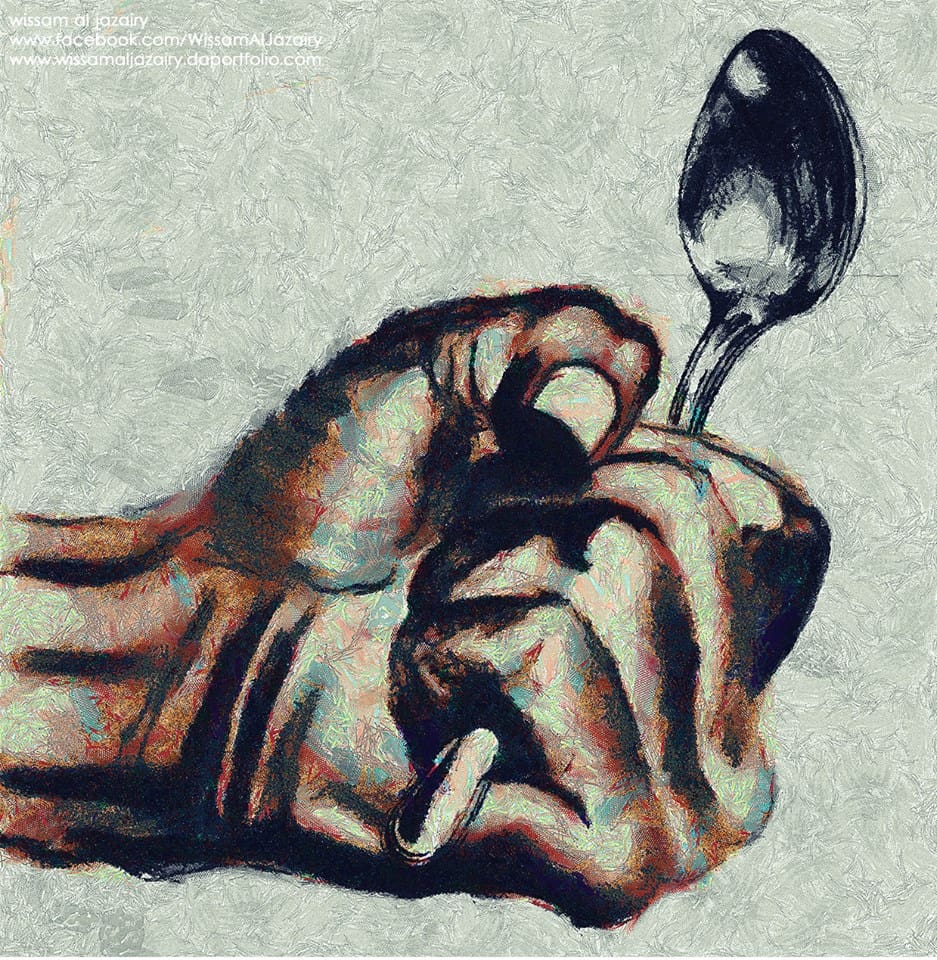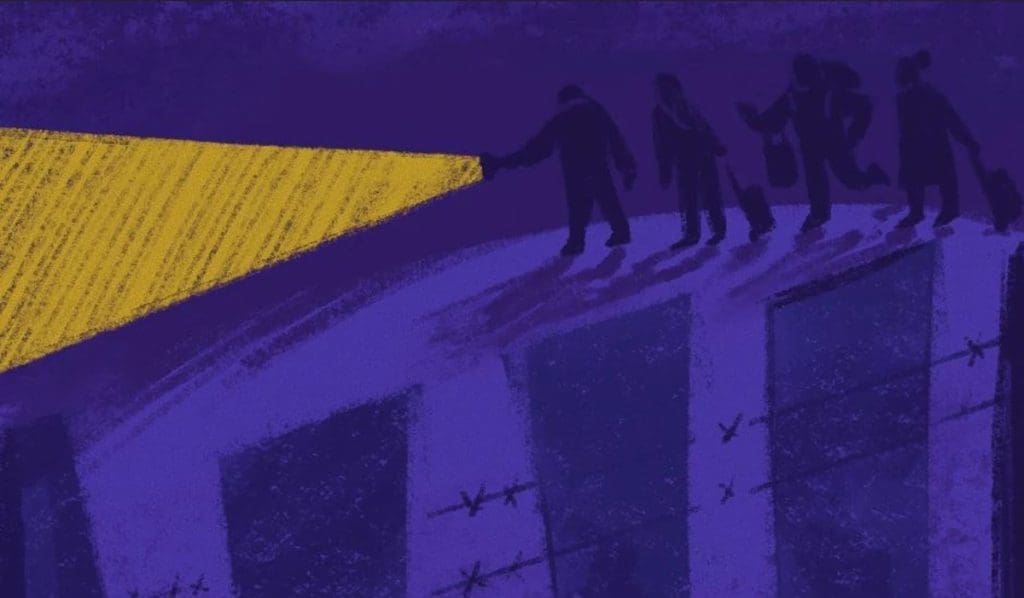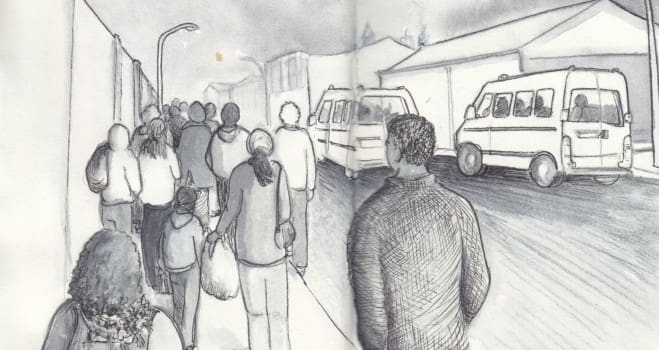“You’re supposed to protect us!”
by Lager Mobilisation Network Berlin for Oplatz.net
10 October 2017 (original post)
Do-it-yourself practice at the Niedstrasse refugee shelter in Berlin – interview with an expert in survival (name changed).
I go to meet Nira in a park somewhere in southwest Berlin. Nira and I had agreed to meet up regularly to write short articles about the situation in the lagers [refugee shelters, often referred to as camps by residents and activists] of Berlin. This time we are going to talk about her experience with social workers at the lager at Niedstrasse, a lager for women and children in the district of Friedenau. Around 320 women and 80 children live there. The lager is run by a social service organization, Niederlausitz (SIN – Soziale Initiative Niederlausitz). Nira lived at Niedstrasse for about ten months, and is still in contact with many women who are still forced to live there.
Official responsibility and “do-it-yourself” practice
Nira says that the problems with social workers are the same everywhere. “Their official responsibility is to read and translate official letters for you, help you make appointments with LaGeSo [Landesamt für Gesundheit und Soziales, or state office for health and social affairs], help you find a Beratungsstelle [counseling center] if you need one, and to invite and arrange for people and organizations to come and give workshops to help you get oriented,” Nira shares. “Their work is to make sure you live in a clean, healthy place, and that you get good, healthy food.” But there is a big gap between official responsibility—the job description—and her lived experienced with social workers in the various lagers she has stayed in.
“Everything is messed up,” she says. Availability of social workers at Niedstrasse is limited to at most a couple hours per day (for a few hundred people!) and often they are not able to communicate with the women because of language barriers. On top of that, the social workers operate in league with security personnel and often refuse to intervene on behalf of women and children targeted by them for mistreatment. What makes this especially problematic is that the lager at Niedstrasse was built expressly to offer special support and protection for women who have experienced trauma.
Nira tells me that during the week the office is only open for one hour a day—on Saturday not at all, and on Sunday two hours: one hour in the morning and one hour in the evening. “One hour a day for 300 women. Most of the time not all languages are available, so for example an Afghan woman might go and there will only be a Russian or a German employee working. She cannot talk to them and they cannot solve her issues, and they just say, ‘Come back tomorrow, come tomorrow.’ It’s very complicated and many problems arise because of this.”
There are seven social workers at Niedstrasse in total: two men and one woman who speak Arabic, one woman who speaks Farsi, one Polish, one Russian, and one man who speaks only German. “What happens if the social worker doesn’t speak your language?” I ask. Nira: “Things get chaotic. They try to do it in English—or the women give up and try to get help from outside and pay for it out of the 135 euros a month they receive. There are many organizations that offer free translation, but the social workers often don’t make use of them.” For some women, those from Balkan countries such as Serbia or Croatia, it’s particularly difficult because no social worker at Niedstrasse speaks their language.
During the week, the office hours are from eleven a.m. to noon, so if a woman has an appointment with LaGeSo, an integration course, or has to take her children to school, she is not able to see a social worker. “Sometimes there are long queues. Sometimes you have to sit and wait for an hour.” Even though the social workers are in the office all day, they are only available for one or two hours a day. Often women receive letters from the BAMF [Bundesamt für Migration und Flüchtlinge, or federal office for migration and refugees] or LaGeSO that require an urgent response. “We used to get the mail in the evening, and then you can’t get help until the next day at eleven.” In this case the women have to ask for help from outside, or rely on other women in the lager or on security staff. But becoming dependent on security staff is dangerous, Nira says, as it puts them in a position of power from which they are able to exert even more control over the women.
“Social workers at Niedstrasse prefer to ignore issues, and act as though nothing is happening. Like they don’t know what to do about it. Most of the time they seem helpless, as though they haven’t had enough training to handle such issues,” Nira shares. People usually spend five to ten minutes with a social worker. “Sometimes they just dismiss people. ‘Go and find a translator yourself, I don’t have time to translate this.’ Or, ‘I cannot help you, I cannot make an appointment for you. Find a doctor yourself.’ We used to help each other as refugees, but it’s also not our job. We don’t get money for it. They get paid for it.”
This negligence, she says, is not without consequence for the women. “There was this one woman from Afghanistan, she had five children,” Nira tells me. “She ran away from her husband because he was very violent. Then she got deported, because she didn’t go to her interview, because the social workers did not give her the letter in time. That was a big mistake. They make mistakes all the time. They don’t understand that this is dangerous. They treat us with negligence.”
Nira shares another story with me: “There was one woman who was asking for an appointment with a doctor. She had to go several times before they were willing you help her, and when they finally made an appointment for her it was at a private clinic. When we went there, they told her she had to pay fifty euros! How can it be that a social worker makes this kind of mistake?”
Women with many children need the most help, Nira says. “My friend has a child and she wanted to register him for kindergarten, and they told her to go and do it herself. One women said, ‘You want to look for apartment? Go online and do it yourself.’ ‘You want to look for a translator, go and do it yourself.’ And then you have to pay extra money. Twenty euros for a translator to translate something for you or to come with you somewhere. The social workers are getting paid by the government but they obviously don’t want to do their jobs.”
They are constantly saying that they are doing their best, Nira tells me, “but then you find the food is very bad. The toilets are very dirty all the time. The women go to the doctor alone without a translator and the doctor is not able to help. I started doing this one-euro job translating for others at doctor visits and other appointments. I went with some women to the doctor, and the doctor told me she hadn’t been able to help them the last time because there hadn’t been a translator. It’s the job of a social worker to find a doctor who can help the women, who speaks the same language.” Seven social workers are not enough, Nira says. “Instead of hiring seventy security workers with fifteen people working every shift, it would be better to hire twenty more social workers.
Don’t speak up!
Ever since the municipal building was turned into a lager in February 2016, women have complained about the social workers, the food, and the security staff. But in April 2017 the first official complaint was made, signed by ninety women, Nira tells me. “It got started because the food was bad, and there was also a complaint from a few women that the social workers were treating them with no respect and sometimes with verbal aggression, like shouting at them. Social workers were threatening these women, threatening to kick them out or to call the police on them. The whole time, the social workers tried to deny that this was happening even though the problems were documented on camera.” The same situation happened in the Tempelhof lager. Social workers had been saying no, there isn’t any sexual violence against women here—only to be caught out in their lie by a six-month-long IRIN investigation that brought the endemic sexual assaults in Berlin lagers to light.
“What happened after the complaint?” I ask. Nira tells me that they threatened the women, trying to scare them into withdrawing the complaint. The women were told that if they made another protest in the lager they would be deported by LaGeSo. Towards the end of April 2017—after the complaint—the regional manager of SIN, Nira says, “was shouting at us like we were slaves, as if we had no rights, and he was protecting the security and social workers.”
What the women need
“There should not be security, but more social workers—at least one from every language group, and also their office door should be open all day long,” Nira demands, “so that when women have a problem they can go and get help. That’s their work, social work. In the place I’m living now, the office is open until five p.m.—from nine a.m. to five p.m. Sometimes you go and they are busy. Really busy. Not sitting and drinking coffee and having a break every hour.”
Things should be done correctly, Nira says. “If there are no good social workers, we should just abolish and close all the lagers and let people live in houses, and then when you need help you can get in touch with a Beratungstelle. Because apparently they do their job quite well; they make a real effort. They are also social workers, but you can see they are trying hard, unlike the social workers at Niedstrasse. At Niedstrasse they are even getting volunteer help from the organization Schöneberg Hilft. It’s not all on them, they are able to offload responsibilities, and still they don’t do a good job.”

Lightly edited for clarity by Antidote, with additional information from the German version that was omitted from the original.
All images: LMNB





